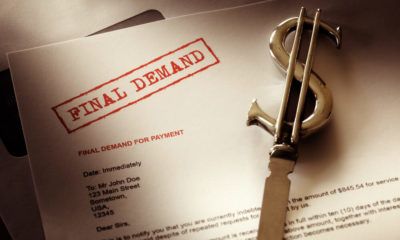Business
How much does a collection agency charge?
Contacting a debt collection agency is a quick and easy way many companies recover their debts. A local one will be more aware of the laws and regulations of a particular area. Some companies have multiple or large unpaid accounts. Dealing with debt is the nature of their business. So instead of paying a percentage for each case, you may find it cheaper to hire a collection agency on a yearly basis.

It’s common for businesses to encounter payment defaulters. But at times like these, every penny counts. Knowing what options are available can make it easier to deal with the debt.
What should you do?
Begin by asking for money, reminding the customer of overdue bills or loans. Send a polite letter inquiring if he’s having trouble with payments or willing to negotiate a payment plan. After 60 days, you can reach out to the person via phone call.
But if 90 days have passed with no sign of money or any response from the debtor, you may want to consider hiring a debt collector or going to court, depending upon the amount.
Consider reaching out to a collection agency
Contacting a debt collection agency is a quick and easy way many companies recover their debts. But a local one will be more aware of the laws and regulations of a particular area.
For a fee, they take the hassle and headache upon themselves. It’s an ideal option for those who simply don’t have the time and resources to recover unpaid accounts. And that means they are free to focus on running the business.
But your decision will depend significantly on how much a collection agency charges and the size of the debt. So just like everything else in business, you need to evaluate the pros and cons. At the end of the day, hiring a debt collector must not negatively impact the bottom line. The cost of recovery shouldn’t outweigh the actual debt.
How much might a collection agency charge?
While the cost can be influenced by several factors, collection agencies rates can differ based on:
- your industry type
- the number of years a collection agency has been in practice
- the locations it serves
- the size of the debt portfolio
- the kind of debt- consumer or commercial
- the age of the account
- the collection strategies or amount of work required to collect the debt
For instance, a licensed, experienced collection agency in Dallas will charge more than one just entering the debt collection business in Idaho Falls.
But that aside, there are two main fee structures that you need to be aware of.
1. Contingency fees
A collection agency can charge a percentage of debt that will be recovered. This is known as contingency fees, and it is the more common pricing method used by collection agencies.
Even though contingency fees often range between 20 – 50% of the delinquent account, the rates are typically negotiable. So that means there is room for bargaining depending upon the size of the debt. Moreover, contingency fees apply only when the collection agency collects on your account.
This is usually used when a company has had delinquent debts for a long time and is proving to be challenging to recover. The fee is generally higher than the other option- fixed fees.
2. Fixed fees
This is not as common as contingency fees; however, it is an available option. Collection agencies can charge a fixed fee for collections. It is usually a low-cost fee that is paid upfront. So that means that you can keep 100% of the funds the agency recovers. It’s a fee structure that comes with no hidden costs and is especially beneficial for companies with several delinquent accounts.
Common question you need to ask before hiring a collection agency :
1. What is the minimum amount?
Some collection agencies have a minimum amount below which they will only take on an account. Some do not accept those below $5000. Make sure you ask what that level is.
2. Are solicitor letters included in the fee?
The recovery process requires sending a letter to the debtor, also known as the Letter of Demand. They hold more weight when coming from a collection agency. Moreover, inquire whether they offer an in-house solicitor that can provide advice on legal matters.
3. Do you have a ‘No Recovery, No Fee’ policy?
A ‘No Recovery, No Fee’ policy is one where the collection agency works on recovering a debt without asking for money. They receive money for their services only when a debt is successfully recovered. Fees are typically deducted from the collected amount.
4. Do you offer annual service charges?
Some companies have multiple or large unpaid accounts. Dealing with debt is the nature of their business. So instead of paying a percentage for each case, you may find it cheaper to hire a collection agency on a yearly basis.
Tip:
Did you know that you can collect debts for free?
Your Terms of Trade document can include a clause that states that a person is legally liable to pay any recovery fees that will be incurred if there is a debt. That means that there are no added expenses on your behalf. They are transferred to the debtor.
Final thoughts
When assessing your options, carefully consider the return you will receive. And don’t forget to negotiate a price. If you discuss the rates over the phone, make sure to ask them to send the quotes via email so that you have something in writing for future reference.
__
(Featured image by mentatdgt via Pexels)
DISCLAIMER: This article was written by a third party contributor and does not reflect the opinion of Born2Invest, its management, staff or its associates. Please review our disclaimer for more information.
This article may include forward-looking statements. These forward-looking statements generally are identified by the words “believe,” “project,” “estimate,” “become,” “plan,” “will,” and similar expressions. These forward-looking statements involve known and unknown risks as well as uncertainties, including those discussed in the following cautionary statements and elsewhere in this article and on this site. Although the Company may believe that its expectations are based on reasonable assumptions, the actual results that the Company may achieve may differ materially from any forward-looking statements, which reflect the opinions of the management of the Company only as of the date hereof. Additionally, please make sure to read these important disclosures.

-

 Crowdfunding7 days ago
Crowdfunding7 days agoBSG Stahl Riesa Launches Crowdfunding for New Floodlights
-

 Africa2 weeks ago
Africa2 weeks agoMASI Surge Exposes Market Blind Spot: The SAMIR Freeze and Hidden Risks
-

 Cannabis4 days ago
Cannabis4 days agoSnoop Dogg Searches for the Lost “Orange” Cannabis Strain After Launching Treats to Eat
-

 Crypto2 weeks ago
Crypto2 weeks agoIntesa Sanpaolo Signals Institutional Shift With Major Bitcoin ETF Investments
























